Books Books Books
I have not been well for a couple of weeks, and in my weak state, I have done some designing on paper, some gentle knitting but a lot of reading. I have a guilty pleasure that I must admit, following reading a Tudor historical novel by Philippa Gregory which someone gave me to read and I almost rejected, I have been hooked on reading about this historical period in time.
So here is my appraisal of the partly fictional but enormously fun novels I have read on this period.
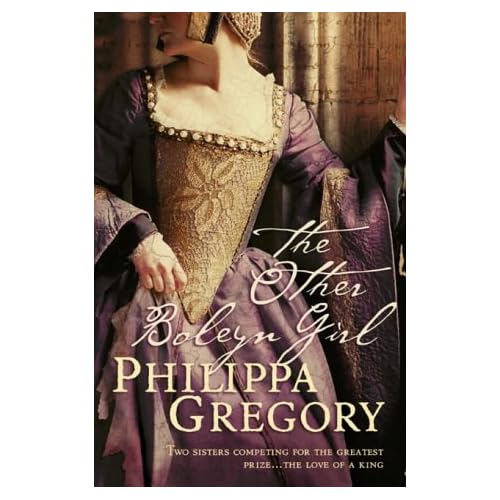 The Other Boleyn Girl Philippa Gregory
The Other Boleyn Girl Philippa Gregory
Should you read it? Yes
This is a very saucy tale of Ann Boleyn's sister Mary Boleyn. I read it thinking that every fact must be true, as the research seemed thorough but I later discovered that Mary Boleyn was the older sister, not the younger sister of Ann. In the novel she is represented as being King Henry VIIs first mistress after Blessie Blount, which is unfounded although there is some assumption that Mary did first catch his eye, followed by Ann, and that even their mother had been a mistress in the past. Anyway, putting aside some facts, reading it as a novel, it moved very fast was a little bit saucy but totally captured the feeling of decadence and danger, and I know that everyone knows that Ann Boleyn was beheaded, but if you are not entirely sure why, I won't ruin it for you!
This novel leads on to the next one I read which was...
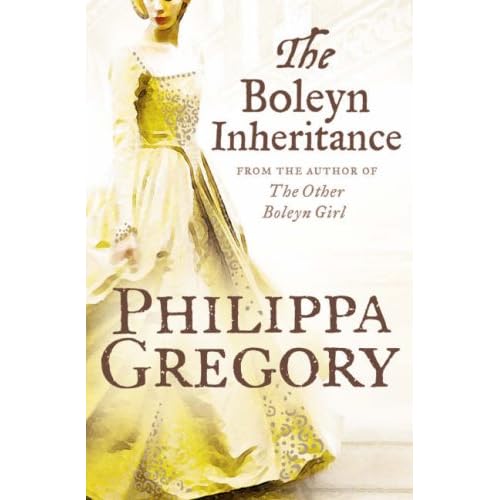 The Boleyn Inheritance Philippa Gregory
The Boleyn Inheritance Philippa Gregory
Should you read it? Probably if you enjoyed the above, but in some ways it is darker
The publishers had very craftily left you wanting more of the above story, and had put a detailed account of the time after Jane Seymour had died, the first meeting of Henry VIII and his 4th wife Ann of Cleves, who thought she was being kissed by a smelly old tramp when in fact His Majesty had hoped to make her believe he was a tall handsome stranger who would make her heart flutter and love him at once as a stranger, then even more when she discovered he was King. She spat and insulted him, in her native German but her intention was clear. I read the book in a couple of days. The story was fluently carried along by the voices of three women who had a perspective on this fated marriage and His Majesty's affair with little Katherine Howard. The fact that some of these wives, were really children being only teenagers to his 48 yrs or so, is something you cannot appreciate if you have seen the recent BBC Drama The Tudors, where they have sauced it up by making King Henry a young man when he is with Ann Boleyn when in actual fact he was nearly 40 and she 13 or 14 when they met. Anyway, sympathy can be felt for the position of all of these women, and each of their perspectives is quite different.
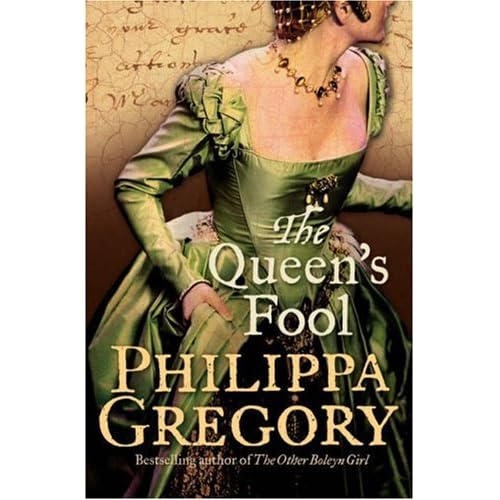 The Queen's Fool Philippa Gregory
The Queen's Fool Philippa Gregory
Should you read it? Not your first choice if you want to read some other Gregory books
I would like to point out at this point, that I didn't read all of these Phillippa Gregory novels in a row, there were plenty of books in between but it is easier for me to compare them like this. This particular book I read and enjoyed the story, but found the writing wanting. There is an annoying habit of characterisation that Gregory uses, where she builds up a picture of the person's physical habits, and we just keep having very limited descriptions of that one action. In this book it was along the lines of "She put her hand to her cheek, as if to wipe smuts from the fire...." because the character's mother was burned as a heretic and this was a device to illustrate the danger that the character felt. But honestly, I nearly abandoned the book because of those darned smuts! Anyway, this story was of the reign of Bloody Mary, Mary Tudor and told from the point of view of her court Fool, which could be a little bit limiting at times, as that fool seemed to be able to get everywhere to witness all the important pieces of history!
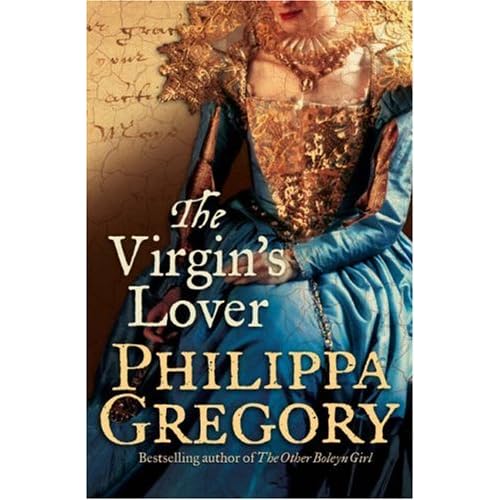 The Virgin's Lover Philippa Gregory
The Virgin's Lover Philippa Gregory
Should you read it? Probably not if you enjoyed the above
This I read after I had read a very good novel about Jane Grey by another author, also a Tudor descendent and fills in the small gap between Edward dying and Mary Tudor coming to reign. Anyway, by comparison, I found this novel vaguley annoying. Once again, there was the Queen working herself up into a state, seeming not to be able to cope without a man at her side to tell her what to do, and I got a bit fed up of her buffing her nails with her fingertips until her cuticles were raw and bleeding and biting her lips into strips. At this period of history, with uncertainty in the reign of Scotland and problems with the French, she got to do those things an awful lot until I was just writhing in my seat. Unlike the other novels where I felt the women were strong, I felt they were weak and flawed in this, and I felt that there was little story and plot surrounding Robert Dudley, Earl of Leicester who is supposed to be Elizabeth I's great love and closest friend. It over sexualised it, and it seemed to trivialise it and limit it to just a year or two in her reign, when the author's notes state that his last letter to her before he died declared his love, and also she had that letter at her bedside when she died (although I heard that she was so stoical she died sitting up in a chair). Robert Dudley's wife was a very pathetic specimen and also had some repetitive character traits, in the novel I mean, I know little of her in real life.
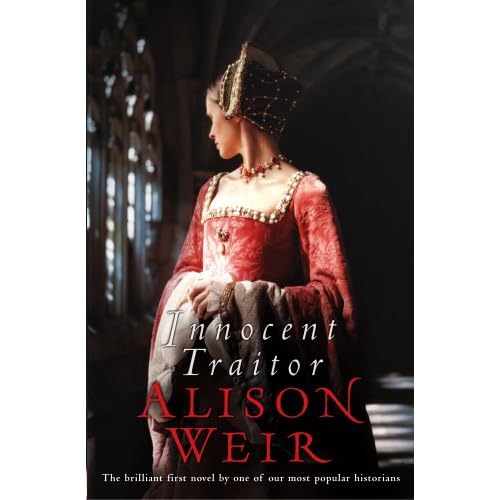 Innocent Traitor Alison Weir
Innocent Traitor Alison Weir
Should you read it? I thoroughly recommend this as a good historical background to the period from a woman's perspective
This was a very touching and detailed account of the Lady jane Grey, her upbringing, her parents ill treatment of her and her marriage to Guilford Dudley (Robert Dudley's brother) and her nine day reign.
It did bring a tear to my eye, and her execution gave me shivers, the thought that one woman could condemn her own cousin to the block, when she was just sixteen was chilling. I would recommend this as a good Tudor read, and it is not deliberately saucy in any way. There are glimpses in this novel of other Tudors such as Elizabeth and Mary, and their phsyical attributes and behaviour are similar but not entirely identical to the portrayal you see in Phillippa Gregory's novel.
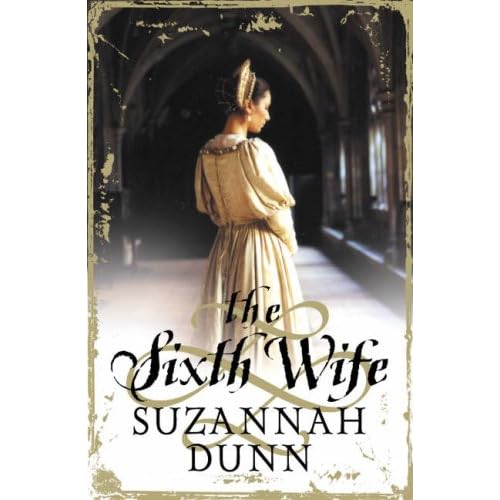 The Sixth Wife Suzannah Dunn
The Sixth Wife Suzannah Dunn
I read this one some time ago, whilst I was on holiday last summer and I think it paints a wonderful picture of the lives of Thomas Seymour (Jane Seymour's brother) and his wife Katherine Parr, who was Henry VIIth's only lasting wife. She took it upon herself to educate her stepdaughters Elizabeth Tudor and Mary Tudor and also took in Lady Jane Grey uner her motherly wing. Her story is told here through the eyes of her best friend, who has a fictional affair with her husband, but there is also some scandal involving Elizabeth and since she was second in line to the throne, it lead to Thomas's overtures of love being classified as treason, and he lost his head.
I am now reading The Constant Princess Philippa Gregory, so I go back in time to learn about the early years of Katherine of Aragon, Henry the VIII's first wife, who was originally married to his brother Arthur who should have come to the throne but didn't, thus leading her to become married to Henry, but 20 odd yrs later it was alleged that this marriage was in actual fact not valid as the Bible forbids a man to marry his brother's wife.
So here is my appraisal of the partly fictional but enormously fun novels I have read on this period.
 The Other Boleyn Girl Philippa Gregory
The Other Boleyn Girl Philippa GregoryShould you read it? Yes
This is a very saucy tale of Ann Boleyn's sister Mary Boleyn. I read it thinking that every fact must be true, as the research seemed thorough but I later discovered that Mary Boleyn was the older sister, not the younger sister of Ann. In the novel she is represented as being King Henry VIIs first mistress after Blessie Blount, which is unfounded although there is some assumption that Mary did first catch his eye, followed by Ann, and that even their mother had been a mistress in the past. Anyway, putting aside some facts, reading it as a novel, it moved very fast was a little bit saucy but totally captured the feeling of decadence and danger, and I know that everyone knows that Ann Boleyn was beheaded, but if you are not entirely sure why, I won't ruin it for you!
This novel leads on to the next one I read which was...
 The Boleyn Inheritance Philippa Gregory
The Boleyn Inheritance Philippa GregoryShould you read it? Probably if you enjoyed the above, but in some ways it is darker
The publishers had very craftily left you wanting more of the above story, and had put a detailed account of the time after Jane Seymour had died, the first meeting of Henry VIII and his 4th wife Ann of Cleves, who thought she was being kissed by a smelly old tramp when in fact His Majesty had hoped to make her believe he was a tall handsome stranger who would make her heart flutter and love him at once as a stranger, then even more when she discovered he was King. She spat and insulted him, in her native German but her intention was clear. I read the book in a couple of days. The story was fluently carried along by the voices of three women who had a perspective on this fated marriage and His Majesty's affair with little Katherine Howard. The fact that some of these wives, were really children being only teenagers to his 48 yrs or so, is something you cannot appreciate if you have seen the recent BBC Drama The Tudors, where they have sauced it up by making King Henry a young man when he is with Ann Boleyn when in actual fact he was nearly 40 and she 13 or 14 when they met. Anyway, sympathy can be felt for the position of all of these women, and each of their perspectives is quite different.
 The Queen's Fool Philippa Gregory
The Queen's Fool Philippa GregoryShould you read it? Not your first choice if you want to read some other Gregory books
I would like to point out at this point, that I didn't read all of these Phillippa Gregory novels in a row, there were plenty of books in between but it is easier for me to compare them like this. This particular book I read and enjoyed the story, but found the writing wanting. There is an annoying habit of characterisation that Gregory uses, where she builds up a picture of the person's physical habits, and we just keep having very limited descriptions of that one action. In this book it was along the lines of "She put her hand to her cheek, as if to wipe smuts from the fire...." because the character's mother was burned as a heretic and this was a device to illustrate the danger that the character felt. But honestly, I nearly abandoned the book because of those darned smuts! Anyway, this story was of the reign of Bloody Mary, Mary Tudor and told from the point of view of her court Fool, which could be a little bit limiting at times, as that fool seemed to be able to get everywhere to witness all the important pieces of history!
 The Virgin's Lover Philippa Gregory
The Virgin's Lover Philippa GregoryShould you read it? Probably not if you enjoyed the above
This I read after I had read a very good novel about Jane Grey by another author, also a Tudor descendent and fills in the small gap between Edward dying and Mary Tudor coming to reign. Anyway, by comparison, I found this novel vaguley annoying. Once again, there was the Queen working herself up into a state, seeming not to be able to cope without a man at her side to tell her what to do, and I got a bit fed up of her buffing her nails with her fingertips until her cuticles were raw and bleeding and biting her lips into strips. At this period of history, with uncertainty in the reign of Scotland and problems with the French, she got to do those things an awful lot until I was just writhing in my seat. Unlike the other novels where I felt the women were strong, I felt they were weak and flawed in this, and I felt that there was little story and plot surrounding Robert Dudley, Earl of Leicester who is supposed to be Elizabeth I's great love and closest friend. It over sexualised it, and it seemed to trivialise it and limit it to just a year or two in her reign, when the author's notes state that his last letter to her before he died declared his love, and also she had that letter at her bedside when she died (although I heard that she was so stoical she died sitting up in a chair). Robert Dudley's wife was a very pathetic specimen and also had some repetitive character traits, in the novel I mean, I know little of her in real life.
 Innocent Traitor Alison Weir
Innocent Traitor Alison WeirShould you read it? I thoroughly recommend this as a good historical background to the period from a woman's perspective
This was a very touching and detailed account of the Lady jane Grey, her upbringing, her parents ill treatment of her and her marriage to Guilford Dudley (Robert Dudley's brother) and her nine day reign.
It did bring a tear to my eye, and her execution gave me shivers, the thought that one woman could condemn her own cousin to the block, when she was just sixteen was chilling. I would recommend this as a good Tudor read, and it is not deliberately saucy in any way. There are glimpses in this novel of other Tudors such as Elizabeth and Mary, and their phsyical attributes and behaviour are similar but not entirely identical to the portrayal you see in Phillippa Gregory's novel.
 The Sixth Wife Suzannah Dunn
The Sixth Wife Suzannah DunnI read this one some time ago, whilst I was on holiday last summer and I think it paints a wonderful picture of the lives of Thomas Seymour (Jane Seymour's brother) and his wife Katherine Parr, who was Henry VIIth's only lasting wife. She took it upon herself to educate her stepdaughters Elizabeth Tudor and Mary Tudor and also took in Lady Jane Grey uner her motherly wing. Her story is told here through the eyes of her best friend, who has a fictional affair with her husband, but there is also some scandal involving Elizabeth and since she was second in line to the throne, it lead to Thomas's overtures of love being classified as treason, and he lost his head.
I am now reading The Constant Princess Philippa Gregory, so I go back in time to learn about the early years of Katherine of Aragon, Henry the VIII's first wife, who was originally married to his brother Arthur who should have come to the throne but didn't, thus leading her to become married to Henry, but 20 odd yrs later it was alleged that this marriage was in actual fact not valid as the Bible forbids a man to marry his brother's wife.













